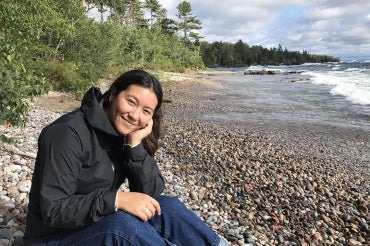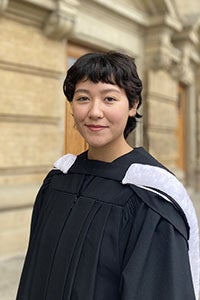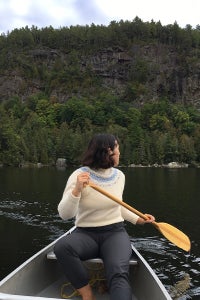'Strive for change': U of T grad Alexandra Gaspar took action and advocated for a sustainable future

Published: November 17, 2021
Alexandra Gaspar has always been inspired to drive positive change.

Outside the classroom, Gaspar – who will be graduating with an honours bachelor of arts degree with a double major in political science and environmental studies this week — was active in a number of student environmental initiatives at the University of Toronto. She worked hard to get involved and contribute to the university community, even while commuting to campus from Mississauga at various times during her undergrad. These experiences helped her hone her leadership skills and discover a passion for research, writing and history.
During her summers at Lake Superior Provincial Park, meanwhile, Gaspar spoke up about ways the park could improve its conservation work and relationships with communities.
Gaspar hasn’t finished her academic journey just yet; she hopes to return to U of T to pursue her master’s in information and museum studies.
“I think this path will allow me to do the things I enjoy the most – research, writing and finding ways to preserve history and share what it teaches us widely,” says Gaspar, a member of University College.
Gaspar recently spoke with writer Rebecca Cheung about her studies and conservation work.
What inspired you to pursue political science and environmental studies at U of T?
I’ve always had an interest in people and communities in current and historical contexts. I enrolled in the political science program so I could have the tools to better navigate the political behaviours and structures that govern our systems.
As I progressed in the program, I became more engrossed in topics that challenged these normative structures, which naturally coalesced into my enrollment in environmental studies. I was already engaged in environmentalism, but I saw the benefit of having a multidisciplinary approach to my studies to achieve a more fulfilling educational journey.
By exploring both of these subject areas, I feel I received a more balanced and holistic degree, which complemented my values and encouraged me to strive for change.
When you reflect on your time serving as an executive member for University of Toronto Students’ Environmental Resource Network (UTERN), what do you consider the group’s greatest accomplishments?
I had the wonderful opportunity to work alongside a passionate and knowledgeable team of student environmentalists while at UTERN.
I served as the representative for U of T Mississauga for one year. I had taken a few classes at UTM, and I had grown up in Mississauga. I wanted to connect UTERN to the UTM campus and did a lot of work laying the foundation for future UTM reps, as the role hadn’t been filled prior to my election. The next year, I was elected as executive secretary.
Although I feel everything UTERN does is important in supporting the organization’s mission for sustainability and justice and for the whole U of T community, I am most proud of the group’s work in urging divestment from fossil fuels by the university. UTERN’s coalition with other environmental student groups and their divestment campaign showcased the power in collectivity, and I believe helped pressure U of T to take real action to end their investments in fossil fuels, which we’ve all heard about recently. The news of the university’s decision symbolized years of hard work and momentum generated and maintained by UTERN and others toward a sustainable future for students – and for everyone.

While working summers at Lake Superior Provincial Park, you considered possible improvements. Tell us about the big changes you want to see at the park.
I greatly enjoyed my time at Lake Superior Provincial Park. I spent two summers there, working in various roles, and I had the opportunity to work closely with park management and local communities.
While there, I worked hard to voice my opinions on the importance of moving toward progressive conservation work and including Indigenous voices in the park’s future. I hope the park’s future includes the return of a biologist, forester or resource management position, which would enable more impactful conservation of the park’s many unique ecosystems and natural heritage. I hope to be part of the park again.
What advice would you give to students considering U of T?
Do not overwhelm yourself and focus on things that complement your interests. I often found the courses and communities I was most drawn to at U of T were those that aligned with my values and passions. The university has so much to offer and caters to a range of interests, so there’s definitely something here for everyone. One of the greatest benefits of going to a school as renowned and large as U of T is that you can find your niche, and there is room to grow as an independent, knowledgeable and passionate individual. You will leave equipped with the skills to create change wherever you go.
As someone who commuted to U of T at various intervals, do you have any tips for student commuters?
Get involved at the university. As cliché as that may sound, trust me, it’s true. If you’re enrolled in a large program or part of a big college, commuting can make meeting people and finding your place at the university feel overwhelming or isolating. Take your time and try various student groups, clubs and organizations until you find one you enjoy. This is a great way to meet others who share your interests, and it will make your university experience that much more fulfilling.
Also, you can find good, inexpensive food in Chinatown if you forget to pack a lunch!
As you set off into the world, what lessons and experiences will you be taking with you from your time at U of T?
I think the feeling of being a graduate is still setting in. I’m still thinking about what’s next and what the last four years have meant to me. U of T taught me that the world has a lot to offer, and I am now starting to realize how well-equipped I am to explore it all. The past four years shaped me into a more critical and independent person who likes a good challenge. The programs at U of T can be demanding and challenging, getting through it all has shown me the depth of my drive, strength and passions, and this is something I will take with me wherever I go next.


